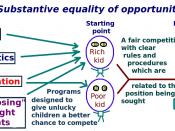Set-aside programs for minorities are a very useful tool in the business world. In my opinion, set-aside programs for minority's levels the playing field for those who need it most. While some Americans would agree and others disagree with this opinion and counter with the, we should all be treated as equal on the basis of our abilities and talents. It's hard to sell this story to the different disadvantaged groups who for years have been outside looking in on the same people trying to sell them this story. The principles of equality of opportunity aren't that old in the United States. The women's movement is only a few decades old, and the gay rights movement is still trying to get its foot in the door of equal rights.
Since 1989, federal courts have issued decisions questioning the legality of local, state and federal procurement set-aside programs. In City of Richmond v.
Croson, the Supreme Court ruled racially oriented policies could be maintained by states and localities only if there was concrete evidence of discrimination. In the 18 years since, federal courts, using Croson as a guideline, have struck down several state and local set-aside programs. In 1995, the Supreme Court applied that same reasoning to federal programs in Adarand v. Pena, which dealt with a set-aside contract from the U.S. Department of Transportation. The judgment stated that "all racial classifications" by government agencies are "inherently suspect and presumptively invalid." A federal district court in Colorado is still reconciling the facts in that case. Even today set-aside minority programs are being attacked and can only be used if racial injustices are proved to be fact.
I will consider the utilitarian and deontological consideration for the use of minorities set-aside programs. To solve this problem would be tantamount to...


